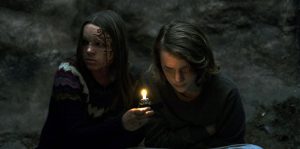
Mina – undead, cannibalistic, her face horrifically scarred – is no longer human, and though she retains characteristics and memories of her former, living self, it’s obvious that she’s the whispered-about monster in the woods that the local folks have come to fear. But although Mina does quickly prove that she’s capable of doing monstrous things, she also sees something in the tormented, traumatized Alex that awakens her sympathy. She takes him in, at first, just to protect him, but as the outside world begins to close in on their remote forest hideaway, their bond takes on a much more human dimension. It’s this prominent emotional thread that pulls The Dark well out of the realm of the standard creature-in-the-woods creepshow, even as Mina continues killing those unwary enough to threaten her.
Unfortunately, though, the film never quite finds a logical or narratively effective place to take its two emotionally and physically scarred adolescent characters, and the story ultimately flails instead of hitting the affecting final note that it should. Both of The Dark‘s young leads turn in mature, confidently nuanced performances – Alexander is especially good, convincing in portraying both Mina’s animalistic rage and her quiet introspection – but they’re often done a disservice by the more half-baked elements of the screenplay. Dialogue is a weakness, too often flat and on-the-nose, and the film’s more haunting qualities are stifled almost every time the characters speak for too long; this is particularly true of Mina, who’s both scarier and more sympathetic in her silent moments. The final stretch offers up some character choices that are admittedly unexpected, but instead of deepening the film’s central ideas and reinforcing its melancholic tone, they mostly just muddy the morality and work against the sympathy that the filmmakers so carefully build up for Mina and Alex early on. It all leads to an ending that’s not much more than a shrug.
“…drops viewers into the midst of an eerie situation without immediately announcing the particulars.”
The Dark‘s visuals certainly do what they can to pull their weight, with the cinematographer and credited co-director Klemens Hufnagl conjuring up plenty of imposing, fairytale-like forest exteriors and some beautifully macabre, almost Gothic-looking shots of Mina’s ruined face, dimly lit by firelight. Likewise, the direction and production design are strong and assured throughout; the film’s rustic, woods-bound settings are used to great atmospheric effect, the kill scenes are appropriately jarring and brutal, and there’s a terrific sequence late in the game, set aboard a moving truck, that’s exceptionally well-shot, staged, and edited for a smaller-budget independent effort.
With all of those assets, and after such a strong start, The Dark can’t be called a failure, and forgiving viewers will likely be able to overlook its faults simply because it looks and feels so much more accomplished than a lot of indie horror fare. But when a movie does so much right – it’s unique and visually arresting and, at times, legitimately moving and surprisingly scary – it’s hard not to wish for something more complete, something that fully and entirely connects. You come away from The Dark with the feeling that this talented team is capable of making a really transcendent horror film – something on the level of, say, an It Follows or a Babadook – and the hope that this represents just a slight misstep on the way there.

The Dark (2018) Directed by Justin P. Lange and Klemens Hufnagel. Written by Justin P. Lange. Starring Nadia Alexander, Toby Nichols, Karl Markovics, Margarete Tiesel.
3 ½ stars out of 5

Beautiful, strong, emotional film. I will say more the drama then just a horror movie. It reminds a bit of “Lat den ratte komma in” … but it’s not the same or some remake. It has some failures of course, but the idea and the story behind it’s far more then that.